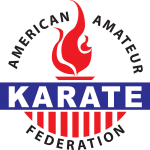Sensei Robert Fusaro
Article by Michele Stillinger (1997)
Master Robert L. Fusaro is one of the highest ranking non-Japanese black belts in the world, currently holding a 7th degree black belt – [update – 9th degree black belt]. He began his karate study in Japan during the Korean War. An American friend invited him to a karate class at the Japan Karate Association headquarters. He decide d to join, not realizing it was to become a lifelong passion.
While training in Japan he had the distinct pleasure of participating in the first Japan Karate Association (JKA) tournament held in 1957. He and seven other non-Japanese students demonstrated semi-free sparring. He also remembers seeing Master Funakoshi seated as an honored guest in the front of the dojo floor while students were demonstrating for him. It would be many years later that the impact of that moment would sink in, realizing that he had actually seen Master Funakoshi and been present at such a historical time in karate.
After being discharged he remained in Japan to continue his training and attempt his first black belt. Unfortunately, a hand injury and an emergency at home kept him from reaching his goal and he had to return to Minneapolis in the fall of 1958. Master Nakayama recommended he continue his training for six months at home and send a progress report along with a film of his techniques back to Japan. Master Fusaro then received his 1st degree black belt in 1959.
Within one month of his return to Minneapolis, Fusaro began teaching karate in the basement of his parents home. He named the school the Twin Cities School of Karate. In 1959 he rented space from a ballet school and later opened his first dojo in downtown Minneapolis in 1960. By this time karate h ad become a passion for Fusaro and he set himself the goal of becoming a master. The dojo moved two other times before ending up in its current location in the University Technology Center building in Dinkytown, near the University of Minnesota where it has been since 1991. This worked conveniently because Fusaro had been teaching accredited karate courses at the University since 1965.
During the early years, he continued to keep in contact with the JKA and learned in 1961 that Master Nishiyama was moving to Los Angeles. Other masters, students of Nishiyama, started arriving in the U.S. and Fusaro began inviting them to Minneapolis to teach. Unfortunately, they could only stay fo r a few days, once a year, so he immersed himself in these brief training sessions learning everything he could. Fusaro started to realize that he gravitated towards Master Nishiyama’s teaching style because of his deep knowledge and understanding of karate and his willingness to share it with everyone.
Fusaro continues to train and teach karate using the wealth of knowledge he gained from Master Nishiyama. His passion for the art has transferred to all aspects of teaching. He takes an active role in the training of all of his students, regardless of rank. He lets them advance at their own pace, encouraging them but never pushing them beyond their abilities. He always maintains a level of familiarity, understanding, flexibility and respect for all his students. He feels that by not interacting with the students, they learn bad habits, and thus, bad karate.
Fusaro has always felt that karate should be open to all ages and both sexes. In fact, he was the person who brought up the proposal that women should be allowed to compete in kumite in tournaments. Up until the late 60’s women were only allowed to take classes. Fusaro now has the pleasure of having trained the first woman 5th degree black belt in the U.S., Nina Chenault. He also trained the first male 5th degree black belt [update: 6th Dan] in the North Central Region, Joel Ertl.
Master Fusaro’s goal has always been to teach karate to anyone willing to learn, and he has often compromised his time, money and personal life to achieve that goal. But that is what makes him truly unique among martial arts instructors. Teaching karate is not really a job to him, it is a way of life that he enjoys.
Fusaro lives in Minneapolis with his wife Gloria who has helped him run the business since they were married in 1961. His two sons, Michael (4th Dan [update: 5th Dan] and Darrell (3rd Dan) continue in their fathers footsteps by teaching at the dojo as well. Two of his female students, Anita Bendickson and Mary Brandl, have gone on to teach a basic self-defense course offered through the U of M as well as several courses offered to business throughout the region. Master Fusaro’s influence and reputation continue to spread throughout the U.S. and his passion for karate continues to spread in the spirit of all his students.
